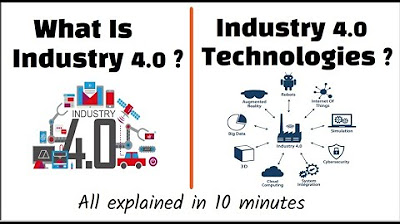Swami Sarvapriyananda's Eye-Opening Talk on Self-Efficacy
Summary
TLDRThis YouTube channel focuses on self-improvement and inspiration, urging viewers to subscribe for valuable insights. The video introduces the concept of self-efficacy, a theory by psychologist Albert Bandura from the 1960s. Self-efficacy is the belief in one's ability to overcome challenges, which distinguishes those who persevere from those who give up at the first sign of difficulty. Highlighting its importance in achieving success, the video emphasizes that self-efficacy is a key component of self-confidence and can significantly impact performance in challenging situations.
Takeaways
- 🎓 Self-efficacy is a psychological concept developed by Professor Albert Bandura in the 1960s.
- 💡 It is the belief in one's ability to succeed in specific situations or accomplish a task, often described as 'I can do it'.
- 🧠 Self-efficacy is considered the first component of self-confidence, emphasizing personal capability.
- 🤔 The concept differentiates between those who give up at the first sign of difficulty and those who persist despite challenges.
- 📚 It is particularly relevant in the context of education, where students with self-efficacy are more likely to attempt tough problems in exams.
- 🏆 Self-efficacy is linked to higher achievement in competitive environments like entrance examinations.
- 🤷♂️ Students lacking self-efficacy may give up without trying, even if they are capable of solving a problem.
- 🧐 The belief in one's ability to face challenges is distinct from actual intelligence or skill level.
- 🌟 The channel aims to inspire and uplift, sharing insights to help viewers become the best version of themselves.
- 🔔 The channel encourages viewers to subscribe for a continuous journey of personal growth and inspiration.
- 📈 The importance of self-efficacy is emphasized as a key to unlocking potential and achieving success.
Q & A
What is the main theme of the YouTube channel mentioned in the transcript?
-The main theme of the YouTube channel is to share valuable insights aimed at uplifting spirits and enriching lives, helping viewers become the best version of themselves.
What does the term 'self-efficacy' refer to?
-Self-efficacy refers to the belief in one's ability to face and overcome challenges in life.
Who is credited with developing the theory of self-efficacy?
-Professor Albert Bandura, a psychologist in the USA, is credited with developing the theory of self-efficacy.
What is the significance of self-efficacy in the context of challenging tasks?
-Self-efficacy is significant as it enables individuals to not back down or give up when faced with challenging tasks, but instead to try and find solutions.
How does the transcript describe the difference in attitude between students with and without self-efficacy when faced with a difficult math problem?
-Students with self-efficacy are willing to attempt solving difficult problems, believing they can overcome the challenge, while those without self-efficacy may dismiss the problem as too hard or out of syllabus and choose not to try.
What impact does self-efficacy have on performance in entrance examinations?
-Self-efficacy can positively impact performance in entrance examinations, as individuals with this belief are more likely to attempt all problems and not give up easily, potentially leading to higher scores.
Why is self-efficacy considered the first component of self-confidence according to the transcript?
-Self-efficacy is considered the first component of self-confidence because it embodies the fundamental belief 'I can do it,' which is the starting point of having confidence in one's abilities.
What does the transcript suggest about the relationship between self-efficacy and intelligence?
-The transcript suggests that self-efficacy is not necessarily about being more intelligent, but rather about having the willingness to try and not give up, which can lead to better outcomes.
How can one share the insights from the video as mentioned in the transcript?
-One can share the insights from the video by becoming Swami Viandas' messenger and sharing the video with three friends.
What is the role of the belief 'I can' in the context of self-efficacy as presented in the transcript?
-The belief 'I can' is central to self-efficacy, representing the self-assurance and motivation to tackle challenges and persist in the face of adversity.
What message does the transcript convey about the importance of trying despite the difficulty level of a task?
-The transcript conveys the message that trying, even when faced with a difficult task, is crucial for personal growth and success, as it is through this effort that one can develop self-efficacy and overcome challenges.
Outlines

This section is available to paid users only. Please upgrade to access this part.
Upgrade NowMindmap

This section is available to paid users only. Please upgrade to access this part.
Upgrade NowKeywords

This section is available to paid users only. Please upgrade to access this part.
Upgrade NowHighlights

This section is available to paid users only. Please upgrade to access this part.
Upgrade NowTranscripts

This section is available to paid users only. Please upgrade to access this part.
Upgrade NowBrowse More Related Video

SAP SD INTRODUCTION 🔥(SESSION1)in ENGLISH 1080P HD QUALITY

Cara Investasi Bitcoin untuk Pemula

What is Industry 4.0? | What are the key Industry 4.0 technologies| All explained in 10 minutes.

Google में कैसे मिली Job बिना College Degree के? Salary, Free Food, Free iPhone & Laptop!

You should start a YouTube channel (even if nobody watches)

BASIC LIFE SUPPORT (BLS) | CPR (Cardio-Pulmonary Resuscitation) | HOW TO SAVE A LIFE
5.0 / 5 (0 votes)